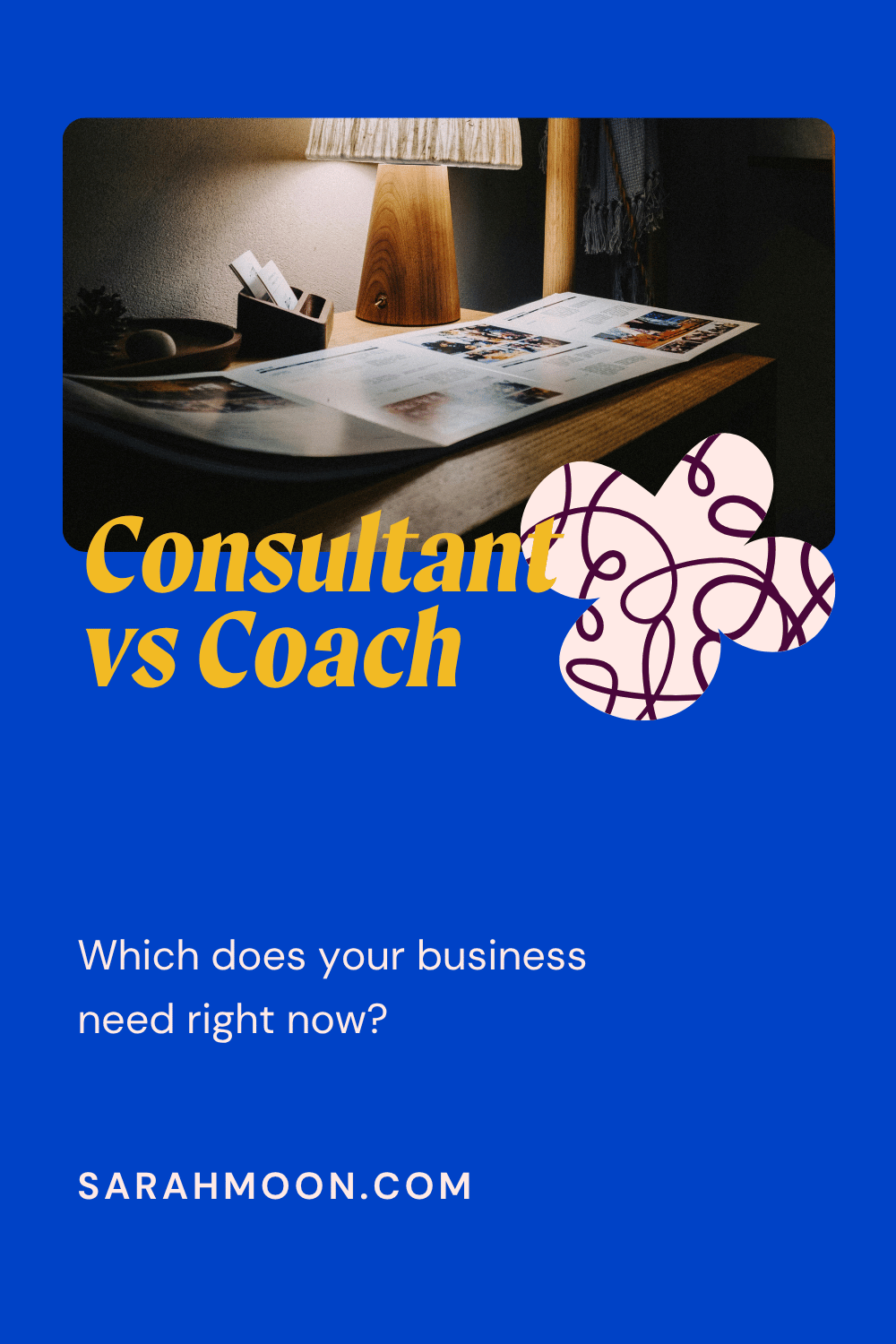Consultant vs Coach: What's Right for Your Business?
If you've been growing your business for awhile, you've probably reached the point where you're wondering if it's time to bring in an outside advisor to help you get a fresh perspective and continue momentum. I know I've been there—and reaching out to someone for help is scary!
When I was first growing Sarah Moon Consulting, I spent so much time trying to figure things out myself, searching Google, reading forums, lurking in business Facebook groups—the whole deal. Like most people, I cobbled together resources and was pretty good at curating information that made sense for me. I eventually enrolled in a few courses to fill in gaps in my knowledge of how to run a a business.
But, eventually, I needed to talk to another human. I remember clearly finally hiring someone for advise. It was so scary. Would they think I was dumb? Judge me for having modest revenue? Tell me to forget growing my business at all?
Fortunately none of those things happened! But, I did learn through that, and other times when I hired advisory support, that there are times when you need a coach, and there are times when you need a consultant. And being able to discern what you need is mission critical so you don't waste your limited time and money.
This article is going to take a look at the key differences between consultants and coaches, offering a detailed exploration of their roles, approaches, and impact. We'll talk about practical guidance for understanding of these distinct professions and their respective contributions to your business development. My goal is that by the end of this piece, you'll know exactly which skillset you need right now!
The Roles and Responsibilities of Consultants & Coaches
Defining the Consultant Role
A consultant (this is how I identify my own work) is an expert who is hired to provide professional advice and guidance in a specific area of expertise. For example, I advise entrepreneurs on marketing and business strategies and have a specific area of expertise in organic discovery, such as SEO. Consultants are typically hired to solve a particular problem, improve performance, or provide specialized knowledge that the business or business owner may lack. They often work on a project basis and are expected to deliver tangible results within a defined timeframe, but others serve in an ongoing advisory role.
Many consultants are also strategists, though not all! This is important to keep in mind. A strategist takes a comprehensive, 360º look at your challenges and goals and facilitates developing a pathway or pathways forward. This is important to keep in mind if you're planning for the longterm in your business.
Some consultants also have coaching or facilitation training as well—be sure to ask what tools are in a consultant's toolkit so you know what to expect!
The Responsibilities of a Consultant
Consultants often have strong research skills. While it's unreasonable to expect they have all the answers, it is reasonable to expect that they can explore your industry or challenge more deeply and give you guidance based on that research. Analysis is also another skill that's non-negotiable for consultants, as it's essential for identifying areas for improvement, developing strategic recommendations, and implementing solutions.
Excellent consultants typically have frameworks or models they use in their practice that are unique to them. (Mine is called the Alignthority® System, and I have a number of copyrighted documents, materials, and teachings I use in within that system.)
Many consultants also provide training and support to ensure the successful implementation of their recommendations. For example, my clients receive materials and recorded resources for their teams and themselves to access even after they've worked with me. Consultants are laser-focused on driving change and achieving specific outcomes for their clients.
Defining the Coach Role
A coach, on the other hand, works with individuals or teams to help them achieve their personal or professional goals. They may or may not be certified, a debate that's been quite hot as of late.
Coaches are, at their core, facilitating the process of self-discovery, enabling their clients to discover their potential and maximize their performance. Coaches typically work with clients on an ongoing basis, such as every other week sessions, but they also offer coaching services such as in an intensive one-day format for specific challenges. While most coaching these days is done via Zoom, there are also coaching retreats and audio-only coaching options.
The Responsibilities of a Coach
Coaches are responsible for providing guidance and support to their clients as they work towards their goals. They employ various techniques such as active listening, questioning, and goal setting to help clients gain clarity and take action.
Coaches may have their own proprietary frameworks or may use those developed by the organization they received their certification through—both are valid and normal for the coaching industry. For example, CliftonStrengths is a popular coaching certification that is in demand for coaches working with leadership or management.
Coaches focus on empowering their clients to make their own decisions and develop the skills and mindset needed for sustained success. This is an important difference in responsibilities with coaches—their are typically no "deliverables" beyond time in most coaching practices.
Approach and Methodology: Consultants vs Coaches
Consultant Approach and Methodology
Consultants typically follow a structured approach that involves gathering data, conducting research, analyzing the current state, developing recommendations, and implementing solutions. They often rely on their expertise and experience to provide specific advice and direction to their clients. The consultant's methodology is results-oriented, with a focus on delivering measurable improvements within a defined scope.
While many coaches claim that consultants don't do deep work with their clients, I've found this to be very untrue. Many consultants work with their clients for a long time and become very invested in their success.
Coach Approach and Methodology
Coaches focus on the individual or team's unique needs and aspirations. They use a variety of tools and techniques to support their clients in gaining self-awareness, setting meaningful goals, and creating actionable plans. Coaches emphasize the development of skills, mindset, and behavior, fostering long-term growth and personal change.
Consultants often criticize coaches for their focus on mindset, but it is a distinctive and helpful practice that many people benefit from.
Impact and Contributions: Consultants vs Coaches
Impact and Contributions of Consultants
Consultants have a direct impact on business performance and progress. Their expertise and strategic thinking can lead to improved processes, clarity on mission and goals, and the adoption of longterm thinking. Consultants play a crucial role in driving change and helping businesses adapt in complex economic times.
Impact and Contributions of Coaches
Coaches contribute to the personal development of individuals and teams, particularly internal work that needs to be done to move forward. Their support and guidance can lead to increased self-confidence, improved communication, better decision-making, and enhanced leadership skills. Coaches also help clients navigate transitions, overcome obstacles, and achieve a greater sense of fulfillment and purpose.
Choosing the Right Professional for Your Needs: Consultants vs Coaches
Factors to Consider When Choosing a Consultant
When considering hiring a consultant, start by asking yourself the following:
Am I looking for feedback and direct advice and am I in a place where I can take action on that feedback?
Do I need longterm thinking and guidance?
Can someone with research expertise help my business?
Do I have a clearly defined goal I want to reach?
Do I want someone to provide me with answers?
This is just a starting point, but if you say yes to those questions, you will likely want to start looking for a consultant to help you with your challenge or opportunity.
Factors to Consider When Choosing a Coach
When thinking about hiring a coach, start with these questions:
Do I want to avoid direct feedback and come to my own conclusions?
Do I prefer open-ended conversations that focus on internal development?
Am I looking for mindset work that will help me improve as a leader or person?
Do I prefer to develop my own answers through a facilitation process?
Am I looking for accountability as a core outcome?
Like with evaluating if you want to work with a consultant, these are just starting point questions for evaluating if a coach is right for you. However, the core difference is the focus on internal work.
Is there overlap between consulting and coaching?
These days, we often see consultants with coaching and facilitation skills and coaches who give advice. Some clients love that the people they work with have varied skills so that have flexibility to use what they need, when they need it.
However, a consultant that focuses heavily on internal work is, in my mind, a red flag, as is a coach who's too directive or prescriptive. This can lead to confusion on the part of clients and frustration with the process. In my own consulting and strategy work, I do sometimes reach for some of my coaching training when a can see that a client feels stuck or overwhelmed. However, I always ask permission first—which is key if you're moving between different modalities.
Ultimately, both consultants and coaches want their clients to succeed—so keep those lines of communication open when you're working with either profession. (Pro tip: Another red flag with both consultants and coaches is if they are not open to discussing scope of work and what they can and cannot do for you.)
Key Takeaways: Consulting vs Coaching
Consultants and coaches play distinct yet complementary roles in supporting personal and business development.
While consultants offer specialized expertise and longterm strategy, coaches provide ongoing support and guidance for personal growth. Understanding the unique contributions of each and considering the specific needs and goals is essential in choosing the right support for success. Which one you need may change as your business develops, and you may even find yourself working with both simultaneously!








Are your students not quite finishing your online course? Our education expert breaks down what you can do to right that ship.